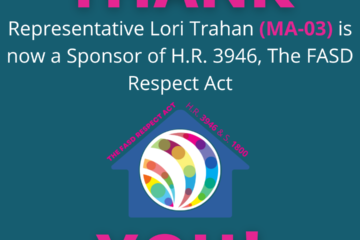
For Immediate Release:
June 22, 2023
Contact:
Jane Meyer, 202-430-7973
Klobuchar, Murkowski, Bacon, McCollum Reintroduce Bipartisan Legislation to Prevent Fetal Alcohol Spectrum Disorders and Support Families Impacted by FASD
WASHINGTON – U.S. Senators Amy Klobuchar (D-MN) and Lisa Murkowski (R-AK) and U.S. Representatives Betty McCollum (D-MN) and Don Bacon (R-NE) introduced the bipartisan Fetal Alcohol Spectrum Disorders (FASD) Respect Act of 2023. This legislation reauthorizes programs to help individuals and families impacted by Fetal Alcohol Spectrum Disorders.
“Prenatal exposure to alcohol and other substances can have a devastating impact,” said Klobuchar. “We must ensure communities have resources to identify and support struggling children and families and increase awareness about Fetal Alcohol Spectrum Disorders to help prevent and treat it. This legislation promoting evidence-based services and interventions will do just that.”
“We must do everything we can to educate on prenatal alcohol exposure and prevent FASD. Too many families in Alaska are impacted by FASD and lack support and interventions services that could truly make a difference in their daily lives,” said Murkowski. “Senator Klobuchar and I are reintroducing this bill in hopes of preventing long-term impacts on children and their families. Every child deserves the best chance possible at a healthy future.”
“Fetal Alcohol Spectrum Disorders (FASD) impact an alarmingly high percentage of children and adults in the U.S, and more research and investments are needed,” McCollum said. “Minnesota has become a national leader in developing best practices for the prevention, recognition, and treatment of FASD. The federal legislation we’ve introduced builds on this success, charting a comprehensive path to address this health issue and eliminate stigma on a national level. I look forward to working with my colleagues on both sides of the aisle to make progress in addressing the needs and improving the quality of life for Americans living with these disorders.”
“Our country is seeing an alarming increase in the number of children affected by Fetal Alcohol Spectrum Disorders. These children are paying the price for the actions of others, and we owe it to them to expand programs related to the treatment and prevention of FASD,” said Bacon. “As a father and grandfather, I am committed to advancing legislation that ensures all children have the resources they need to succeed in life.”
“I first became aware of FASD over 2 ½ decades ago while serving as Minnesota’s First Lady and a Juvenile Court judicial officer. Many youths from families with long substance use histories were failing and not responding to traditional interventions. It became clear then and is still true today that our systems of care are failing this population by not recognizing and/or understanding their FASD complex needs,” said FASD United Board Chair and former First Lady of Minnesota, Susan Shepard Carlson. “As a country, we can and should do so much better for those with an FASD and their families. The FASD Respect Act will begin to bring much needed focus and resources to systemically address this huge societal problem. The FASD community thanks the Senate and House sponsors for leading the charge to enact this much needed bipartisan FASD legislation.”
“Thanks to the determined efforts of Senators Murkowski and Klobuchar we have a bill that balances ongoing research and public health with vital, overdue direct assistance benefiting children and adults living with FASD. A bill that all lawmakers can support and one that respects and ranks first the needs of a grateful and deserving FASD community,” said Tom Donaldson, President and CEO of FASD United.
Fetal Alcohol Spectrum Disorders includes diagnoses such as Fetal Alcohol Syndrome (FAS), partial Fetal Alcohol Syndrome (pFAS), Alcohol-Related Neurodevelopmental Disorder (ARND), Neurobehavioral Disorders Associated with Prenatal Alcohol Exposure (ND-PAE), alcohol-related birth defects (ARBD) as well as possibly severe physical, mental, behavioral, and learning disabilities. FASD is caused by prenatal alcohol exposure (PAE), an enduring public health issue throughout the United States. A study published in the Journal of the American Medical Association identified as many as 1 in 20 first graders across the country impacted by FASD. There is no cure for FASD, but research shows that FASD-specific early intervention services can improve developmental outcomes. PAE is the leading known cause of developmental disabilities, and those with FASD may face many social, cognitive, and emotional challenges throughout their lifespan.
The FASD Respect Act calls for a prompt, coordinated response to PAE, and all prenatal substance exposures, to preserve the health and well-being of our nation’s children and families. Specifically, the FASD Respect Act of 2023:
- Reauthorizes federal FASD programs by directing the Secretary of Health and Human Services to establish or continue a comprehensive FASD awareness, prevention, identification, intervention, and services delivery program which may include:
- Educational and public awareness outreach targeting professionals in systems of care;
- Screening, assessment, identification, and diagnosis;
- Developing and expanding screening and diagnostic capacity for FASD;
- Developing, implementing, and evaluating targeted FASD-informed intervention programs;
- Research on FASD as appropriate; and
- Building State and Tribal capacity for the awareness, prevention, identification, intervention, treatment, and support of individuals with FASD and their families
- Establishes Fetal Alcohol Spectrum Disorders Centers for Excellence to build local, Tribal, State, and national capacities to prevent and identify the occurrence of FASD and other related adverse conditions, and to respond to the needs of individuals with FASD and their families. Centers of Excellence may:
- Conduct outreach activities to raise public awareness of the risks associated with alcohol consumption during pregnancy
- Act as a clearinghouse for evidence-based resources on FASD prevention, identification, and culturally aware best practices
- Disseminate ongoing research and information and developing resources on FASD to help inform systems of care for individuals with FASD across their lifespan.
- Increase awareness and understanding of efficacious, evidence-based FASD screening tools and culturally- and linguistically appropriate evidence-based intervention services and best practices across systems of care
- Improve capacity for State, Tribal, and local affiliates dedicated to FASD awareness, prevention, and identification and family and individual support programs and services (technical assistance provided by FASD Center of Excellence).
###


